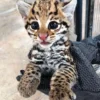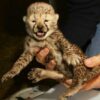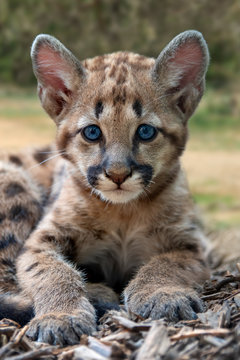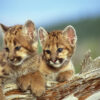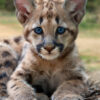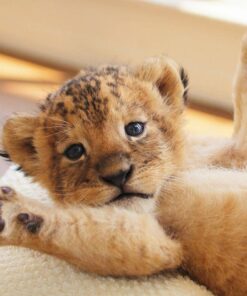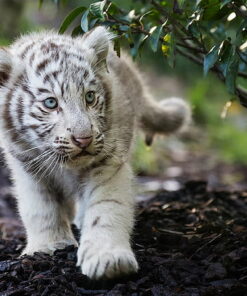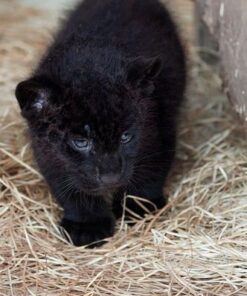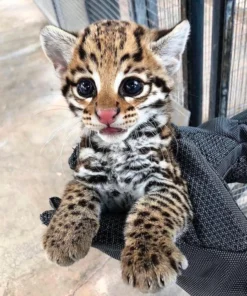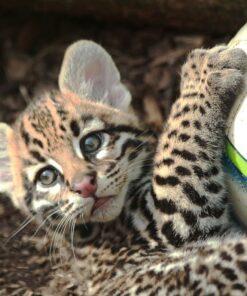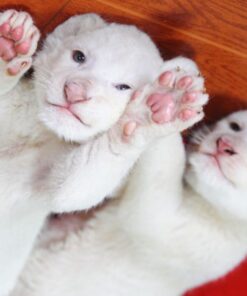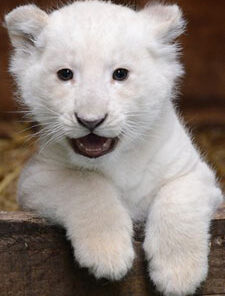$2,300.00
Cougar Cubs For Sale, Big cats like cougars need large, spacious outdoor cages, or enclosures. Because cougars are wild, predatory animals,
Cougar Cubs For Sale: Understanding and Caring for These Majestic Big Cats
Cougar cubs for sale, like their adult counterparts, are both strikingly beautiful and incredibly elusive creatures. Also known as mountain lions, pumas, or panthers, cougars are native to North and South America, and they have captured the imagination of wildlife enthusiasts for generations. In this guide, we’ll explore everything you need to know about cougar cubs, including their life stages, behaviors, and, more importantly, the responsibilities and ethical considerations of owning one. Whether you’re simply fascinated by these animals or actively searching for cougar cubs for sale, this article will give you a thorough understanding of what’s involved in caring for such a magnificent creature.
Cougar Cubs: A Natural Overview
Cougars are solitary, adaptable predators that inhabit a wide range of environments, from forests to deserts. Their cubs are born with distinctive features that make them instantly recognizable.
The Birth and Early Development of Cougar Cubs
Newborn cougar cubs are born blind and completely helpless, depending entirely on their mothers for protection, warmth, and food. At birth, they typically weigh between one to two pounds (0.45 to 0.9 kg) and are covered in spotted fur. These spots help camouflage them from predators, but as they grow older, the spots gradually fade, leaving behind the solid tan or reddish-brown coat that cougars are known for.
For the first few weeks, newborn cougar cubs stay hidden in dens made by their mothers, who will move them to different locations to avoid detection by predators like wolves or bears. As the cubs’ eyesight and motor skills develop, they begin to explore their surroundings under their mother’s watchful eye. During this period, they are particularly vulnerable, and the mother will fiercely defend them from any threats.
Growth Stages and Behavior
grow rapidly, and by around six weeks of age, they begin to leave the den with their mother. At this point, they start to transition from a milk-based diet to eating small prey their mother has hunted for them. It’s during this phase that the cubs learn essential survival skills, such as stalking, hunting, and recognizing danger.
Cougar cubs typically remain with their mother for 12 to 24 months, depending on the availability of food and the level of danger in their environment. During this time, they rely on her not only for food and protection but also to teach them the skills they’ll need to survive on their own once they disperse to establish their own territory.
Cougar Cubs for Sale: What You Should Know
The idea of purchasing a cougar cub might sound exciting to some, but it’s essential to understand that these animals are wild creatures with highly specific needs. While there may be advertisements for cougar cubs for sale, prospective buyers need to take into account the significant ethical, legal, and practical responsibilities involved.
Legal Considerations
Owning a cougar, like many other exotic animals, is subject to strict legal regulations. In the United States, for example, the ownership of cougars is regulated at both the federal and state levels. Some states outright ban the private ownership of big cats like cougars, while others may allow it with proper permits and licenses. These laws are in place to protect the welfare of the animals and the safety of the public.
If you’re considering purchasing a cougar cub, you must first research your local laws and obtain the necessary permits. In many areas, you’ll be required to demonstrate that you have the appropriate facilities to house and care for the animal, as well as the expertise needed to manage a large predator.
Ethical Considerations
Even if you can legally own a cougar cub, you should carefully consider whether it’s the right decision ethically. Cougars are wild animals, not domesticated pets, and they require vast amounts of space and specific conditions to thrive. In captivity, many cougars suffer from stress, boredom, and health problems due to inadequate environments or improper care.
Before searching for a cougar cub for sale, ask yourself whether you can truly provide for the animal’s needs. Cougars need large enclosures that mimic their natural habitats, a specialized diet, and regular access to veterinary care. They also have strong natural instincts that may make them unpredictable or dangerous, even if raised from a young age.
Finding Reputable Sources
If you are set on finding cougar cubs for sale, it’s critical to work with reputable breeders or wildlife sanctuaries that prioritize the animals’ well-being. Avoid sources that participate in illegal wildlife trade or fail to meet ethical standards of care.
Accredited breeding programs may offer cougar cubs for sale, but they typically come with stringent application processes. These breeders will want to ensure that their cubs are going to homes where they will receive proper care and attention. Be prepared to demonstrate your experience with exotic animals and your ability to meet the specific requirements of cougar ownership.
Caring for Cougar Cubs
Owning a cougar cub is a long-term commitment that requires a deep understanding of their physical, emotional, and social needs. Caring for a cougar is vastly different from caring for a domesticated animal like a dog or cat.
### Housing and Space Requirements
Cougars are highly active animals that require plenty of space to roam. In the wild, they have large territories that can range from 10 to over 300 square miles. While it’s impossible to replicate this in captivity, you’ll need to provide a large, secure enclosure with plenty of room for the cougar cub to run, climb, and explore.
1. *Enclosure Size:* A cougar cub needs an enclosure of at least several hundred square feet, but ideally, the space should be much larger as the cub grows. The enclosure should include both open areas and natural features like rocks, trees, and hiding spots to simulate their natural environment.
2. *Security:* Cougars are strong and agile, so the enclosure must be constructed with reinforced materials to prevent escapes. High walls and a secure roof are essential, as cougars are excellent climbers and jumpers.
3. *Environmental Enrichment:* To keep a cougar cub mentally stimulated, you’ll need to provide enrichment activities like toys, obstacles, and puzzles. Without these, the cub can become bored, leading to destructive behavior or health problems.
Diet and Nutrition
Cougars are carnivores, and their diet should consist primarily of fresh, raw meat. In the wild, cougars hunt and consume animals like deer, elk, rabbits, and birds. In captivity, you’ll need to provide a diet that closely mimics their natural prey.
1. *Newborn Cougar Cubs:* For the first few weeks of life, newborn cougar cubs rely entirely on their mother’s milk. If hand-rearing a cub, you’ll need to use a specially formulated milk replacer designed for carnivores. Bottle feeding should be done frequently, mimicking the natural feeding schedule of the cub.
2. *Transition to Solid Food:* Around 5 to 6 weeks of age, cougar cubs can begin eating small amounts of ground meat. As they grow, you can introduce larger portions and whole prey items like chicken or rabbit.
3. *Feeding Frequency:* Cougar cubs have high energy needs and should be fed multiple times a day to support their rapid growth. As they mature, the feeding frequency can be reduced, but they will still require a significant amount of food each day.
Veterinary Care
Cougars are prone to various health issues, including metabolic bone disease, dental problems, and stress-related conditions. Regular veterinary care from a professional experienced in exotic animals is crucial.
1. *Vaccinations and Preventive Care:* Like all animals, cougar cubs need vaccinations to protect them from common diseases. Work with your vet to establish a vaccination schedule tailored to their needs.
2. *Routine Health Checks:* Regular veterinary check-ups are essential for monitoring the cub’s growth and catching any health issues early.
3. *Emergency Care:* Having a plan in place for emergencies is critical when caring for a cougar cub. Make sure you have access to a veterinary clinic that specializes in exotic animals.
Socialization and Behavior
Cougars are solitary by nature, and they are not naturally inclined to form strong social bonds with humans or other animals. However, early socialization is important to ensure that the cub is comfortable around people and can be safely managed.
1. *Interaction with Humans:* While cougar cubs may bond with their caregivers, it’s essential to remember that they are wild animals. Handling them with care and respect is important to avoid behavioral problems later in life.
2. *Behavioral Challenges:* As cougars grow older, they can become more difficult to manage. Even a well-socialized cougar may exhibit aggressive or territorial behaviors as it matures, so having a plan in place to manage these challenges is essential.
Conclusion: A Lifelong Commitment
Cougar cubs are undeniably fascinating and beautiful creatures, but they are also wild animals that require specialized care and environments to thrive. Before searching for cougar cubs for sale, consider the legal, ethical, and practical aspects of owning such a powerful predator.
Cougar ownership is not for everyone, and it requires a deep commitment to the animal’s well-being. If you are passionate about cougars and want to make a difference in their conservation, there are many ways to support cougar populations without owning one. Donating to wildlife organizations, volunteering at sanctuaries, or even adopting a cougar symbolically through a reputable organization can all contribute to the protection and preservation of these majestic animals.
For those who are serious about acquiring a cougar cub for sale, working with ethical breeders and ensuring you have the proper permits, facilities, and knowledge will be key to providing a safe and fulfilling life for the animal also,Ultimately, owning a cougar cub is an extraordinary responsibility that should only be taken on by individuals with extensive experience in managing large exotic animals. Cougars are not just pets; they are powerful wild animals with instincts and needs that go beyond what the average person can provide. Before making the decision to bring a cougar cub into your life, it’s crucial to weigh all the factors and consider the long-term commitment you are making.
Considering Alternatives to Ownership
For many animal lovers, the desire to connect with cougar cubs can be fulfilled in ways that don’t involve ownership. The following alternatives allow you to appreciate and support these beautiful creatures while also contributing to their conservation.
Visit Wildlife Sanctuaries
One of the best ways to see cougar cubs up close and learn about their care is by visiting accredited wildlife sanctuaries. These facilities offer a safe environment for cougars that have been rescued from illegal ownership or inadequate living conditions. By visiting, you not only support the sanctuary’s mission but also have the opportunity to observe these animals in a setting that prioritizes their well-being.
Symbolically Adopt a Cougar
Many wildlife organizations offer symbolic adoption programs where you can “adopt” a cougar in the wild. Although you won’t bring the animal home, your donation helps fund efforts to protect cougars and their natural habitats. These programs often include updates on the animal you’ve adopted, allowing you to follow their progress and learn more about their lives in the wild.
. Support Conservation Efforts
Instead of looking for a cougar cub for sale, consider supporting conservation programs aimed at preserving wild cougar populations. Cougars face threats from habitat loss, human-wildlife conflict, and illegal hunting. By donating to reputable conservation organizations or participating in advocacy efforts, you can play a role in safeguarding their future in the wild.
Conclusion: A Careful Decision
In conclusion, while the allure of owning a cougar cub may seem appealing, it’s important to recognize the profound commitment and responsibility that comes with it. Cougars are not domesticated animals and require a level of care, space, and expertise that goes far beyond the needs of typical pets. If you are seriously considering finding cougar cubs for sale, it’s essential to educate yourself thoroughly, work with ethical breeders, and ensure you can provide a lifelong home that meets all of the animal’s needs.
For most people, the best way to interact with cougars is by supporting conservation efforts, visiting wildlife sanctuaries, or adopting cougars symbolically. These options allow you to enjoy the beauty and majesty of these incredible animals while also contributing to their protection and well-being in the wild.
Whether you’re fascinated by newborn cougar cubs or the powerful adult cats they grow into, one thing is certain: cougars are remarkable creatures deserving of our respect and care. By making informed, responsible choices, you can play a role in ensuring their survival for generations to come.
In the end, the decision to pursue owning a cougar cub should not be made lightly. It’s a lifelong commitment that requires significant resources, time, and dedication. However, for those with the passion, knowledge, and means to provide for these magnificent animals, the experience can be incredibly rewarding. But for most people, supporting cougars from afar through ethical means is the best way to admire and protect these animals.
Related products
EXOTIC CUBS FOR SALE
EXOTIC CUBS FOR SALE
EXOTIC CUBS FOR SALE
EXOTIC CUBS FOR SALE

